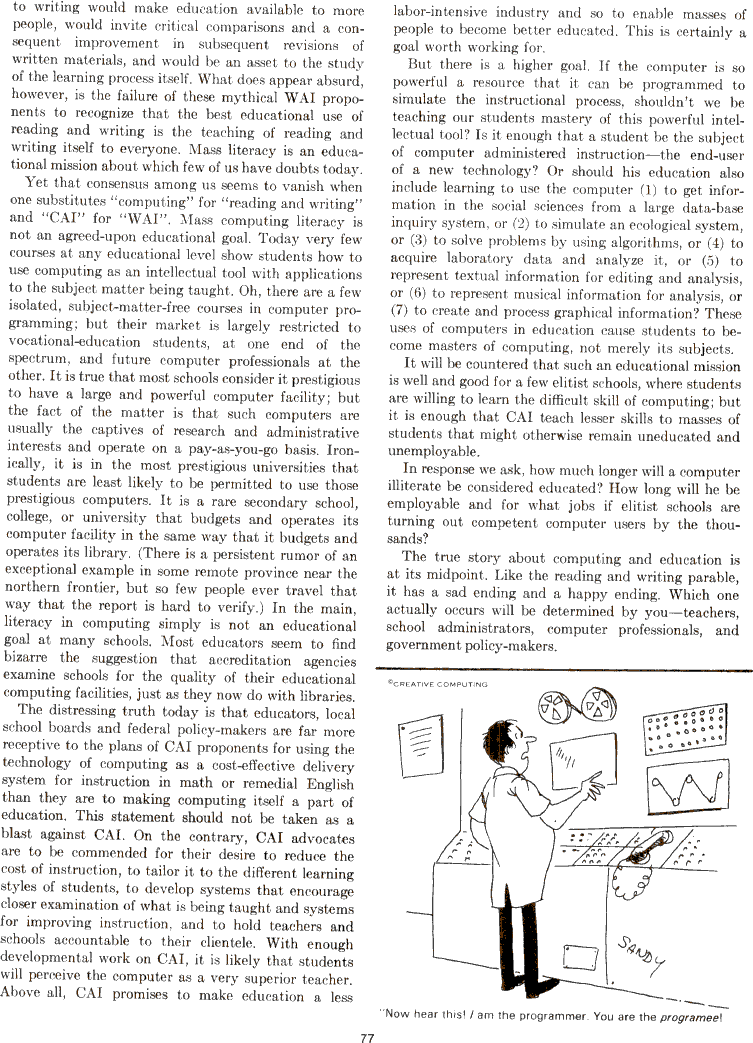The Best of Creative Computing Volume 2 (published 1977)
Should the Computer Teach the Student, or Vice-Versa?

to writing would make education available to more people, would invite critical
comparisons and a consequent improvement in subsequent revisions of written
materials, and would be an asset to the study of the learning process itself.
What does appear absurd, however, is the failure of these mythical WAI
proponents to recognize that the best educational use of reading and writing is
the teaching of reading and writing itself to everyone. Mass literacy is an
educational mission about which few of us have doubts today.
Yet that consensus among us seems to vanish when one substitutes "computing" for
"reading and writing" and "CAI" for "WAI". Mass computing literacy is not an
agreed-upon educational goal. Today very few courses at any educational level
show students how to use computing as an intellectual tool with applications to
the subject matter being taught. Oh, there are a few isolated,
subject-matter-free courses in computer programming; but their market is largely
restricted to vocational-education students, at one end of the spectrum, and
future computer professionals at the other. It is true that most schools
consider it prestigious to have a large and powerful computer facility; but the
fact of the matter is that such computers are usually the captives of research
and administrative interests and operate on a pay-as-you-go basis. Ironically,
it is in the most prestigious universities that students are least likely to be
permitted to use those prestigious computers. It is a rare secondary school,
college, or university that budgets and operates its computer facility in the
same way that it budgets and operates its library. (There is a persistent rumor
of an exceptional example in some remote province near the northern frontier,
but so few people ever travel that way that the report is hard to verify.) In
the main, literacy in computing simply is not an educational goal at many
schools. Most educators seem to find bizarre the suggestion that accreditation
agencies examine schools for the quality of their educational computing
facilities, just as they now do with libraries.
The distressing truth today is that educators, local school boards and federal
policy-makers are far more
receptive to the plans of CAI proponents for using the technology of computing
as a cost-effective delivery
system for instruction in math or remedial English than they are to making
computing itself a part of education. This statement should not be taken as a
blast against CAI. On the contrary, CAI advocates are to be commended for their
desire to reduce the cost of instruction, to tailor it to the different learning
styles of students, to develop systems that encourage closer examination of what
is being taught and systems
for improving instruction, and to hold teachers and schools accountable to their
clientele. With enough developmental work on CAI, it is likely that students
will perceive the computer as a very superior teacher.
Above all, CAI promises to make education a less labor-intensive industry and so
to enable masses of
people to become better educated. This is certainly a goal worth working for.
But there is a higher goal, If the computer is so powerful a resource that it
can be programmed to simulate the instructional process, shouldn't we be
teaching our students mastery of this powerful intellectual tool? Is it enough
that a student be the subject of computer administered instruction-the end-user
of a new technology? Or should his education also include learning to use the
computer (1) to get information in the social sciences from a large data-base
inquiry system, or (2) to simulate an ecological system, or (3) to solve
problems by using algorithms, or (4) to acquire laboratory data and analyze it,
or (5) to represent textual information for editing and analysis, or (6) to
represent musical information for analysis, or (7) to create and process
graphical information? These uses of computers in education cause students to
become masters of computing, not merely its subjects.
It will be countered that such an educational mission is well and good for a few
elitist schools, where students are willing to learn the difficult skill of
computing; but it is enough that CAI teach lesser skills to masses of students
that might otherwise remain uneducated and unemployable.
In response we ask, how much longer will a computer illiterate be considered
educated? How long will he be
employable and for what jobs if elitist schools are turning out competent
computer users by the thousands?
The true story about computing and education is at its midpoint. Like the
reading and writing parable, it has a sad ending and a happy ending. Which one
actually occurs will be determined by you-teachers, school administrators,
computer professionals, and government policy-makers.
[image]
"Now hear this! /am the programmer. You are the programee!


